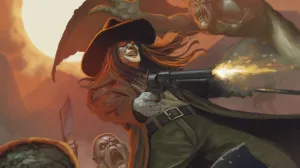As genres go, fairy tales and their offshoots such as fables and nursery rhymes are a rich playground for creatives. With themes and characters rooted in human nature and behavior, the time-tested tales can be easily molded to be simultaneously familiar and fresh with a realism that still allows one to descend into the simplicity of “once upon a time.” It’s what makes the world of fairy tales a perfect fit for the world of comics, particularly with tales that seek to turn the almost child-like shine of things upside down to something grittier and darker. However, grittier and darker doesn’t always mean better and unfortunately, that’s the case with AfterShock Comics’ Tales of Mother F. Goose.
Videos by ComicBook.com
Tales of Mother F. Goose, written by Frank Tieri, is an outgrowth of two other stories written by Tieri that previously appeared in anthologies published by AfterShock, “Little Red Hood” and “Along Came a Spider,” stories that establish the world that Tales of Mother F. Goose is set in overall. It’s a world dominated by the crime boss Don Francesco Orca and where Mother F. Goose picks up an investigation into the death of someone who was about to roll on the Don. The investigators? Jack Horner and Little Miss Muffet.
What follows in the book’s pages is kind of a fascinating series of explanations of the various characters, each of them various fairy tale and nursery rhyme figures all given this gritty, noir twist, until leading to a stunning conclusion—the crime gets solved, but not exactly in the way one might hope. It’s those reversals that Tieri does very well with, and it makes Tales of Mother F. Goose, in total, an interesting read. Jack Horner doesn’t stand a chance, but you don’t necessarily figure that out right away because Tieri does a solid job of keeping the clues that our boy’s in danger very well hidden in the rest of the comic. It’s the path that the comic takes to draw those connections that, while Tarantino-esque, actually feels pretty cumbersome. There are a lot of winding details and it’s all written out in the book. It would work brilliantly in a film (which is arguably why Tarantino’s films work as well as they do) but as a written story, it drags a bit and unless one is very dedicated to reading all the details, the urge to cut to the chase kicks in pretty quickly. That isn’t a criticism of Tieri’s story per se; it’s just an observation about the format in which he’s telling it.
What helps keep things moving along is the art. Somehow, this comic manages to pack in a variety of visual styles. There’s everything from noir to Western, to realism on the pages of Tales of Mother F. Goose and the talents of Eisma and Herms come together really well. Honestly, the comic possesses very strong artwork, which makes it a lot more fun than you might expect given how story-heavy the rest of the comic is.
The bottom line on Tales of Mother F. Goose is this: while the comic is very narrative-heavy, if you are a fan of gritty reimaginings, this comic will scratch a certain itch and Tieri has a knack with interesting twists that make it worth a reader’s while. That said, the idea of making fairy tales and nursery rhymes dark is already one that feels played out and there isn’t much to this comic book that is nearly enough to lift it up to fulfilling one-shot status, save for the outstanding art. It’s not great, but it’s also not bad and maybe that’s where Tales of Mother F. Goose wins. It falls right in that middle, with a pulpy sensibility that isn’t for everyone by design.
Published by AfterShock Comics
On December 8, 2021
Written by Frank Tieri
Art by Joe Eisma
Colors by Matt Herms
Letters by Carlos M. Mangual
Cover by Joe Eisma








